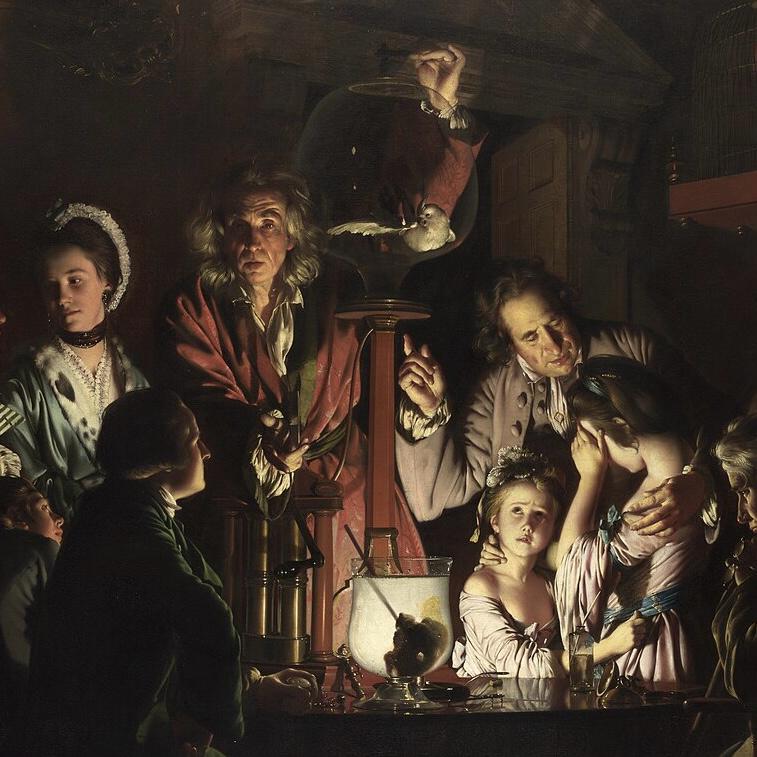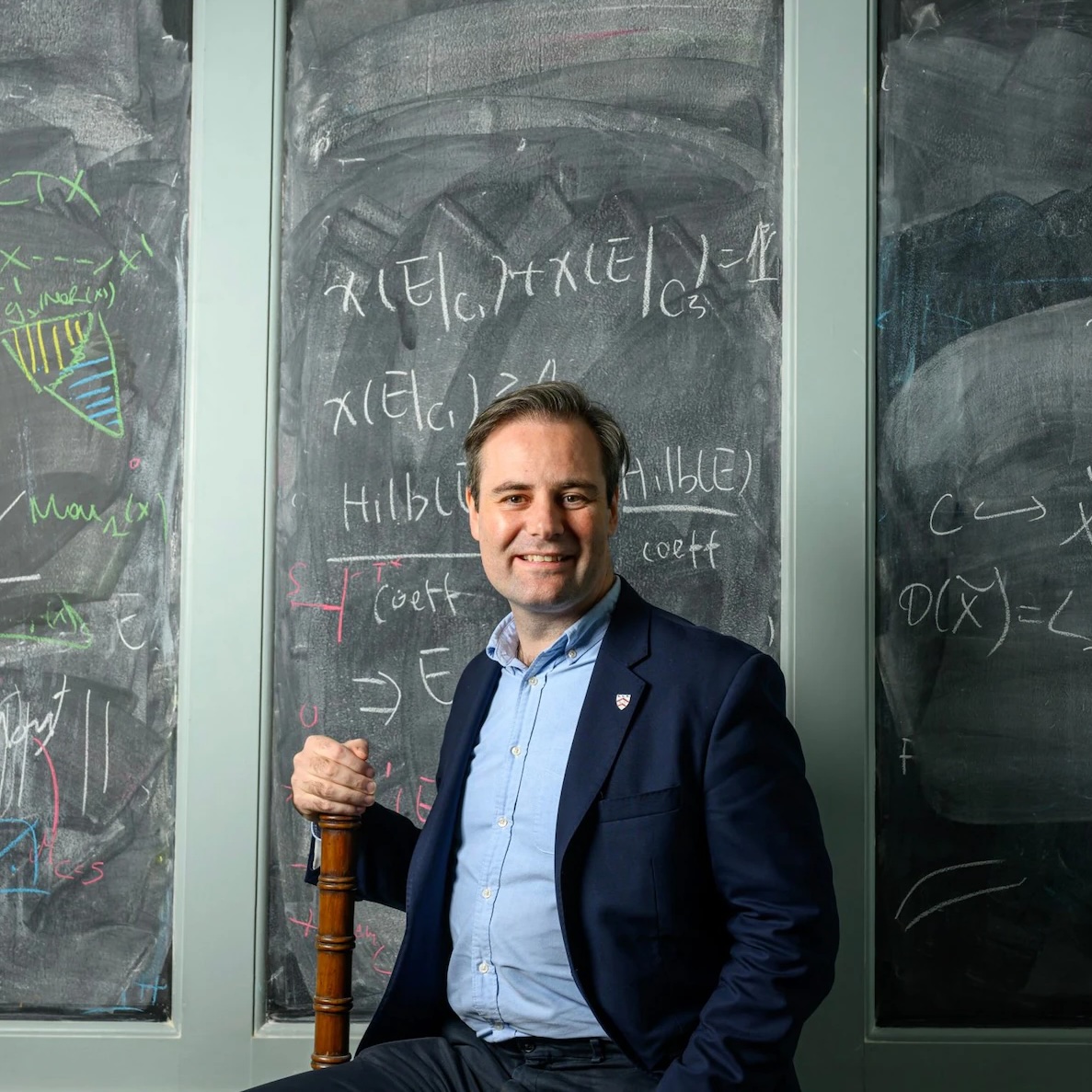Perspectives are essays that express our point of view on important topics. They range from the value of basic science, to how to speed up research, to why we show up for work. Our perspectives are shaping the debate on how to organise discovery across Britain and the world.

The art of science
On the day of the Nobel awards, our writer Thomas Hodgkinson writes in The Critic about the common ground between the arts and the sciences.

The art of the Delo
Our trustee Ben Delo talks to The Sunday Telegraph’s James Titcomb about his journey from bitcoin billionaire to free speech philanthropist.

Bubble trouble
In his Financial Times column on the AI boom, John Thornhill quotes our live interview with physicist and entrepreneur Stephen Wolfram.
A bridge with India
Nature India’s editor hails our Ramanujan Junior Researchers scheme, inspired by the friendship between Srinivasa Ramanujan and G.H. Hardy.
Murmuration of assent
In a letter in The Sunday Times, our fellow Yang-Hui He affirms that, with the proper support, AI promises to reshape discovery itself.
Faraday’s masterclass
In The Oldie, our writer Thomas Hodgkinson celebrates the Royal Institution’s Friday Evening Discourses, the world’s oldest science talks.
Friday night live
In the Idler, our writer Thomas Hodgkinson recounts how Michael Faraday inaugurated a 200-year-old masterclass in public speaking.
London Institute Council
We have updated the role of trustees and created a forum of governors to help us thrive. Together, these form the London Institute Council
A Fields Medal for AI?
The Financial Times features Prof. Yang-Hui He in a piece highlighting the potential impact of future AI models on academic mathematicians.
Rebel with a cause
Ben Delo talks to Thomas Hodgkinson in *Perspective* about beating Asperger’s, smoking the competition and why he likes the London Institute.
The most valuable cargo
As US science funding falters, Britain creating posts for top American researchers would be a win for science on both sides of the Atlantic.
Liking the like?
In The Times, our writer Thomas W. Hodgkinson reviews a compelling history of the “like” button, co-written by our Trustee Martin Reeves.
My passion for maths
In a time of government cuts to mathematics, the entrepreneur and philanthropist Ben Delo explains why he’s funding a new Fellowship at LIMS.
The art of blackboards
In *Nautilus*, our scientists talk about the beauty of blackboards and why they're still the best way to solve problems in the 21st century.
Re-ordering Russia
Mikhail Khodorkovsky talks to Thomas W. Hodgkinson about the future of Russia and why he supports Fellowships at the London Institute.
Launch of Irix
The London Institute, which uses humans to speed up fundamental discovery, launches Irix, a company that harnesses machines to do the same.
Science needs Russians
Like chess, theoretical research is an international game played in the language of patterns. Its intrinsic value transcends politics.
From physics into maths
In a feature in Nautilus, Ananyo Bhattacharya investigates why physical insights from the real world are proving so useful in mathematics.
From physics into maths
Why are physical insights from the real world proving so useful for solving abstruse problems in pure mathematics, Ananyo Bhattacharya asks.
Life of Riley
The Times' science editor interviews our new Trustee, Talulah Riley, about her love of physics and her work with the London Institute.
How we work
At the London Institute, our model for organising discovery emphasises teamwork as well as individualism. Here, we discuss how we work together in-person to be more than the sum of our parts, adapt quickly and balance focus with interaction.
Beyond politics
Russia's brain drain is Britain’s gain. Yet the pursuit of knowledge, thorough global scientific collaboration, should transcend politics.
Talking is thinking
Talking engages robust muscles of thought—not least when mathematicians take their problems to the blackboard, argues Thomas Hodgkinson.
Let's talk about science
For its 225th birthday, our writer Thomas Hodgkinson hails the Royal Institution as proof of the vital importance of science communication.
Making waves
A team including Oleksandr Gamayun has made the first mechanical metamaterial that transmits topological solitons in just one direction.
Science goes pro
Professional sport has a lot to teach scientists about pushing the limits of human achievement—so why are we still content to be amateurs?
THE TIMES
The language of maths
Tom Whipple of The Times explains how, thanks to our Arnold and Landau Fellowships, theorists divided by war find a common denominator.
TROITSKY VARIANT
Science without borders
Our Arnold and Landau Fellowships continue a tradition of contact and collaboration between British and Russian scientists dating back to Newton.
The times
The beautiful game
In The Times, our Director Thomas Fink argues that maths, accelerating discovery by spotting patterns in patterns, deserves its own Nobel.
The times
Landau lives on
Creating Fellowships for scientists affected by the war in Ukraine will not only help them, it will also be a major boost for British science.
THE DAILY TELEGRAPH
History repeats itself
The Royal Institution supported scientists fleeing 1930s authoritarianism. Now, thanks to our Arnold Fellowships, history repeats itself.
THE DAILY TELEGRAPH
From Russia with math
History suggests our new posts for physicists and mathematicians from Russia, Ukraine and Belarus will have an enduring impact on UK science.
Designing web design
To mark our Webby nomination, we describe the design principles behind our website and how they evolved in tandem with the Institute itself.
THE SPECTATOR
Why we must boldly go
The human impulse to look beyond the horizon, “to boldly go where no man has gone before”, leads us to the most transformative discoveries.
THE TIMES
23 mathematical challenges
To mark the launch of ARIA, which aims to tackle the toughest problems, we made a list of the top 23 mathematical challenges of our time.
THE DAILY TELEGRAPH
The intelligent organisation
Showing up for work makes organisations more intelligent, because it lets workers switch between focus and interaction in an unplanned way.
THE SPECTATOR
Britain’s version of DARPA
As the government creates its Advanced Research and Invention Agency, it could learn from the exceptional history of the Royal Institution.
Move to the Royal Institution
The London Institute has moved into the iconic Royal Institution, where it will expand its programme of curiosity-driven theoretical science.
SCIENCE IN PARLIAMENT
Independent science
Supporting non-university research institutes with core funding will finally give aspiring researchers an alternative to a university job.
THE SPECTATOR
Roger Penrose’s singular mind
Physicist Roger Penrose discusses the art of science, AI hype and links between playfulness and profundity in an interview with Thomas Fink.
the guardian
The value of theory
From Newton to Maxwell to Penrose, Britain has always excelled at theoretical science—so why doesn't the government do more to support it?
LIMS-Bit.Bio partnership
The cell coding company Bit.Bio has joined forces with the London Institute on their moonshot mission to programme every human cell type.
THE SPECTATOR
Back to basic science
Basic science—the kind done without consideration of its usefulness—leads to the biggest breakthroughs, which is why we need to protect it.
open access government
Basic science after Brexit
EU funding favours applied research over basic science, but Brexit is a chance to redress the bias and protect curiosity-driven research.
TIMES HIGHER EDUCATION
A new kind of science
More independent research centres would provide an alternative to the university model of research, where teaching is bolted to science.